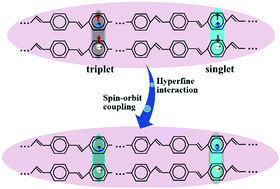Strongly enhanced luminous efficiency of organic light emitting diodes in molecular heterojunctions
Abstract
We report a comprehensive theory based on the extended Su–Schrieffer–Heeger (SSH) model to study the interconversion from the dark triplet exciton state to a bright singlet one in molecular heterojunctions, containing both intrachain and interchain excitons. By studying the spin mixing and the projection of excitons onto the pure singlet and triplet excitons, unlike usual methods, we found that the internal electroluminescent quantum efficiency, which is largely determined by the singlet fraction, can be widely tuned by the spin–orbit coupling strength, the intensity of hyperfine interaction, electron–phonon coupling and the site energy offset of the two chains constituting the molecular heterojunctions. In addition, the interchain excitons possess a higher fraction of singlet states in comparison with the intrachain excitons. Remarkably, it can reach up to 52% by proper choice of the above-mentioned physical parameters. Our results outline a novel approach to further improve the luminous efficiency of organic light emitting diodes.



 Please wait while we load your content...
Please wait while we load your content...